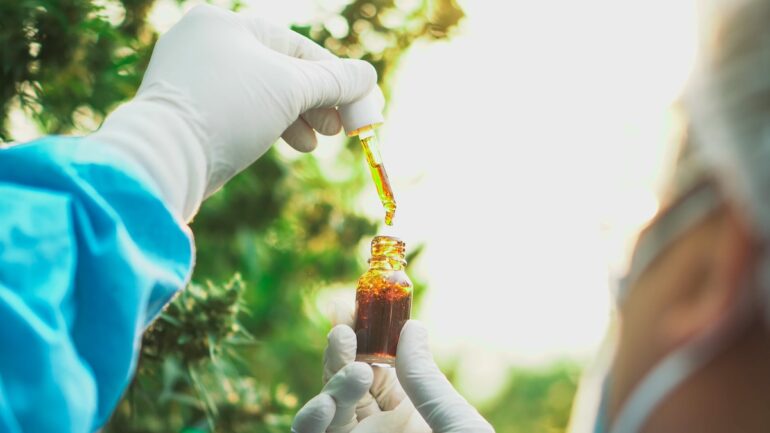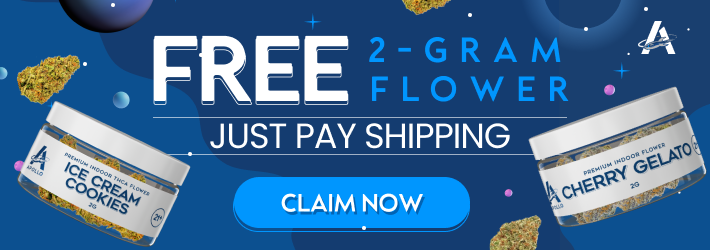Hexahydrocannabinol (HHC) is a cannabinoid that is naturally present in cannabis plants, but retail products with HHC are semisynthetic. This fine and important distinction depends on how and where the product is sourced.
Trace quantities of HHC are naturally present in cannabis cultivars, including several HHC isomers, and likely contribute to cannabis’ euphoric high. Trace HHC quantities typically mean up to 1% of a whole cannabis plant’s cannabinoid profile, which isn’t enough for producers to create HHC products cost-effectively.
Therefore, producers must get creative and chemically synthesize HHC from isolated CBD. Delta-9 and even delta-8 THC can also theoretically be used as a starting point, but in reality, this is less likely since hemp is plentiful and legal these days.
While synthetic processes using industrial hemp are the most efficient way of creating commercial HHC products, there are questions over their safety for consumers and their legality on the state and federal levels.
Is HHC a Natural Cannabinoid?
Yes, hexahydrocannabinol (HHC), and some HHC isomers, are naturally-occurring cannabis compounds found in small concentrations in cannabis pollen and seeds.
Not all HHCs are equal, though, because stereochemistry creates isomers and epimers with different effects. For example, the R epimer (R-HHC) is quite psychoactive, while S-HHC may have little psychoactivity.
HHC hemp products like vapes, flower, and edibles contain semisynthetic HHC. Because of the processing, they may also come along with varying HHC isomers and byproducts like delta-8, delta-9, and more that consumers may not be aware of. All of these factors, especially the ratio of R:S HHC, makes a huge difference in your experience with HHC.
Specific high-potency cannabis cultivars carry trace quantities of natural HHC and several HHC isomers, including 9α-hydroxyhexahydrocannabinol (9-OH-HHC) and 7-hydroxyhexahydrocannabinol (7-OH-HHC).
Theoretically, there are up to eight HHC isomers, but in reality we only find two consistently: 9R HHC and 9S HHC.
HHC and HHC isomers comprise roughly 1% of a cannabis plant’s total cannabinoid profile, making them minor cannabinoids. Other minor cannabinoids include tetrahydrocannabivarin (THCV), delta-8, and delta-10.
Producers cannot create HHC products cost-effectively from cannabis or hemp plants carrying up to 1% HHC. They would need hundreds if not thousands of them. Therefore, producers rely on synthetic conversion processes to boost, concentrate, and purify HHC quantities in their products.
How Is HHC Made?
Roger Adams first taught us how to make HHC in 1944. Typically, the process of making HHCs starts with CBD from legal industrial hemp. This is most common in today’s commercial climate.
From a bird’s eye view, this is a two-step procedure:
- Hemp-based CBD is acid-treated into delta-9 and delta-8 THC
- Hydrogenation creates a mixture of R-HHC and S-HHC. You could also skip step one if starting with either delta-9 or delta-8 THC.
Additionally, delta-9-tetrahydrocannabinol (delta-9) naturally degrades to form HHC and HHC isomers in the cannabis plant over long periods.
Research shows this degradation occurs even without direct UV light exposure and at storage temperatures between 37 and 50°F. When delta-9 degrades to HHC, it loses the double bond and ester atom on its molecular structure, making it more stable and resistant to UV and heat.
Synthetic delta-8 and delta-9 conversion processes are not natural, per se. Producers hydrogenate isolated THC molecules by chemically saturating them with hydrogen atoms and then exposing them to palladium on carbon catalysts. They are extracted into an ethanol (alcohol) solution.
This combination creates a chemical reaction that causes THC’s double bond to break from its molecular structure. The hydrogen atoms replace the double bond, which makes them more stable and UV and heat-resistant.
Is HHC Made in a Lab?
Yes, most producers synthesize and create HHC under laboratory conditions, allowing them to make HHC products safely without exposing workers to physical harm from potentially combustible elements.
Producers should consider implementing robust operating procedures and health and safety guidelines to create a safe environment for lab workers, including:
- Mandatory personal protection equipment (PPE)
- Minimal chemical exposure
- Correct chemical labeling
- Routine equipment checks
- Emergency training
However, a safe laboratory for workers doesn’t always equal safe HHC products suitable for human consumption. Many chemically synthesized cannabis products are contaminated with byproducts, and solvents, incorrectly labeled, and unsuitable for human consumption, including HHC, delta-8, and delta-10 products.
These further highlight the importance of professionally made and third-party tested products.
Is HHC Harmful?
Natural HHC isn’t known as any more or less harmful than other naturally sourced cannabinoids like delta-9, delta-8, or CBD. In fact, there is limited evidence of potential benefits from HHC and HHC analog for cancer, pain, and sleep prolongation.
However, as seen with mass-produced, chemically-synthesized delta-8, many producers sell potentially harmful HHC products filled with dangerous contaminants unsuitable for human consumption. Worse, some HHC products carry more than the labeled quantity of HHC and delta-9, making the effects stronger than expected.
References
- Ahmed, S. A., Ross, S. A., Slade, D., Radwan, M. M., Khan, I. A., & ElSohly, M. A. (2015). Minor oxygenated cannabinoids from high potency Cannabis sativa L. Phytochemistry, 117, 194–199. https://doi.org/10.1016/j.phytochem.2015.04.007
- Casati, S., Rota, P., Bergamaschi, R. F., Palmisano, E., La Rocca, P., Ravelli, A., Angeli, I., Minoli, M., Roda, G., & Orioli, M. (2022). Hexahydrocannabinol on the Light Cannabis Market: The Latest “New” Entry. Cannabis and Cannabinoid Research. https://doi.org/10.1089/can.2022.0253
- Geci, M., Scialdone, M., & Tishler, J. (2023). The Dark Side of Cannabidiol: The Unanticipated Social and Clinical Implications of Synthetic Δ8-THC. Cannabis and Cannabinoid Research, 8(2), 270–282. https://doi.org/10.1089/can.2022.0126
- Golombek, P., Müller, M., Barthlott, I., Sproll, C., & Lachenmeier, D. W. (2020). Conversion of Cannabidiol (CBD) into Psychotropic Cannabinoids Including Tetrahydrocannabinol (THC): A Controversy in the Scientific Literature. Toxics, 8(2), 41. https://doi.org/10.3390/toxics8020041
- Johnson, L. (2021, October 21). CBD Oracle Lab Study Shows Some Delta-8 Products Are 7700% Over the Legal Delta-9 THC Limit. CBD Oracle. https://cbdoracle.com/news/delta-8-thc-products-market-study-consumer-safety-and-legality/
- Russo, F., Vandelli, M. A., Biagini, G., Schmid, M., Luongo, L., Perrone, M., Ricciardi, F., Maione, S., Laganà, A., Capriotti, A. L., Gallo, A., Carbone, L., Perrone, E., Gigli, G., Cannazza, G., & Citti, C. (2023). Synthesis and pharmacological activity of the epimers of hexahydrocannabinol (HHC). Scientific Reports, 13(1), Article 1. https://doi.org/10.1038/s41598-023-38188-5
- Thapa, D., Lee, J. S., Heo, S.-W., Lee, Y. R., Kang, K. W., Kwak, M.-K., Choi, H. G., & Kim, J.-A. (2011). Novel hexahydrocannabinol analogs as potential anti-cancer agents inhibit cell proliferation and tumor angiogenesis. European Journal of Pharmacology, 650(1), 64–71. https://doi.org/10.1016/j.ejphar.2010.09.073
- Turner, C. E., Hadley, K. W., Fetterman, P. S., Doorenbos, N. J., Quimby, M. W., & Waller, C. (1973). Constituents of Cannabis sativa L. IV: Stability of Cannabinoids in Stored Plant Material. Journal of Pharmaceutical Sciences, 62(10), 1601–1605. https://doi.org/10.1002/jps.2600621005
- Watanabe, K., Itokawa, Y., et. al. Table 2 Antinociceptive effects of 9α-OH-HHC and 8-OH-iso- HHC in mice. (2007). ResearchGate. Retrieved November 24, 2023, from https://www.researchgate.net/figure/Antinociceptive-effects-of-9a-OH-HHC-and-8-OH-iso-HHC-in-mice_tbl1_225788188
Last medically reviewed on November 24, 2023

